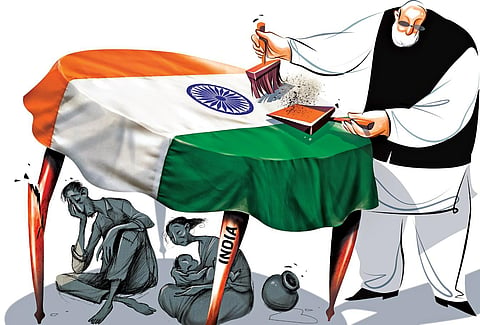

Recent events in the country have shown that there is not only a disconnect between the people and those who govern them but the institutional structures of the country are also being eroded, slowly yet surely.
On the one hand, we celebrate the unique position of India in the context of the global community looking at our country as the new investment destination. The manufacturing of chips to be used in semiconductors, the possible investments in that sector, the interest of Elon Musk, now the proprietor of Twitter, to launch Tesla electric vehicles in the country, the much-touted popularity of our dear prime minister for his forays into several national capitals of the world, proximity with our Quad partners in our intent to make sea lanes secure in the South China Sea, our proximity with Japan and its interest in India as an attractive alternative investment destination are matters that definitely suggest that if India responds positively and builds an appropriate architecture for foreign investment, it will have much to gain.
On the other hand, we are witnessing an India where violence against women continues unabated, an India where, while Manipur burns, governance structures are clueless and choose to be silent, not willing to listen to the wailing cries of women, of families, and of a whole community bearing the brunt of ethnic violence. In the midst of all this, we find our prime minister’s silence inexplicable. Our home minister, who should have known of the wanton killings in Manipur, chose to immerse himself in the election campaign in Karnataka and waited till May 29 to go to Manipur while the state had been burning since May 4. This shows how our governance structures are insensitive enough not to respond to situations as volatile as the one in Manipur.
The manner in which our women wrestlers were treated, and the investigating agencies’ unacceptable response which resulted ultimately in Brij Bhushan Singh getting bail, shows the disconnect between the concerns of the people and the partisan interests of the political party in power. The way in which the Bilkis Bano case resulted in the early release of those convicted for life for an unthinkable heinous crime—and the manner in which the BJP feted and garlanded them—suggests that while they celebrate the act of criminals, the victims lose hope.
We also witness lynching of innocent, defenceless victims in broad daylight; their only fault is perhaps the caste and community they belong to. The investigating machinery is loath to prosecute the accused and when prosecuted, chooses to turn a blind eye to their guilt. Hate speeches directed towards a particular minority community have become rampant, with even some ministers of the ruling dispensation taking the lead.
Institutional structures, too, have a lot to answer. Parliament as an institution has become dysfunctional—the ruling establishment, with its brute majority, chooses to do what it wants, without realising that both the Lok Sabha and the Rajya Sabha are chambers for debate where the Treasury Benches should allow matters as serious as Manipur to be discussed openly without fetters of timelines. Legislative business in the Parliament is conducted only to fulfil procedural necessities. Important bills having far-reaching ramifications are rushed and passed with no scope for debate and discussion. At the same time, we watched with great concern the use of the investigating machinery to topple governments, discredit the opposition leaders and seek to destabilise elected governments in opposition-ruled states. In this context, we watched with dismay as the Supreme Court allowed for the extension of an appointment which it previously held to be illegal.
We also witness draconian laws being invoked to suppress dissent and personal liberty being taken away with utter disregard to the concept of proportionality; rights guaranteed under our Constitution are being violated without compunction and the majoritarian viewpoint is ruthlessly foisted upon us. People and communities stand divided. Those aligned with the ideology of the ruling class are preferred to those with an alternative viewpoint. Minorities are often targeted and find themselves at the receiving end of the mighty State apparatus. Jingoism rules the roost, with the rule of law targeting dissenting voices. Those in opposition are perceived to be anti-national. Forging a broad-based alliance in opposition to the government is mocked while the suspect alliances of the ruling party with insignificant motley parties are projected as the alliance for the future.
Prices of diesel and petrol and inflation in relation to essential commodities and services have resulted in millions of our people not being able to access essentials for the survival of their families. The common man struggles to keep pace with the ever-widening gap between his income and expenditure. He has no resources left to invest in the future of his children.
Unemployment remains high, hovering above 8%. Only 73 million out of the 150 million urban workforce have a full-time job. The youth unemployment rate is on the rise too. According to the World Bank, nearly a quarter of Indians aged between 15 and 24 were jobless in 2022. At the same time, real wages in rural India have contracted for 16 consecutive months as of March 2023.
The focus has shifted from the welfare of the masses to the well-being of a select few. A country’s growth, in the context of our people’s well-being, cannot be judged solely based on GDP, where the rich thrive and the poor look to survive. This is the state of my India today and together, we need to change it.
(Views are personal)
Kapil Sibal
Senior lawyer and member of Rajya Sabha
(Tweets @KapilSibal)